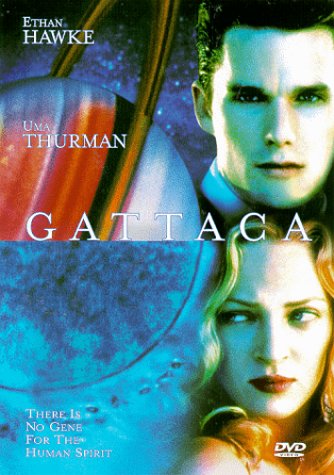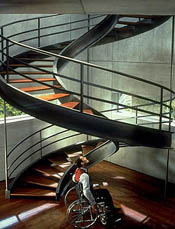
Gattaca (1997)
With the advancement of genetic-related technology, from cloning to in-vitro fertilization, Gattaca addresses the ethical and social concerns, depicting a liberal society where children are breeded based on life expectancy, intelligence, height, and a whole plethora of genetic features. The film also speaks on the results of economic inequality, where the rich will naturally afford more "genetically-ideal" children while the lower class will "resort" to traditional sexual reproduction, a sort of "biotech divide."
Plot Summary & Background
In the not-too-far future, Vincent Freeman (Ethan Hawke) is one of the few naturally conceived human beings left, often referred to as an "in-valid." Discriminated against because of his genetic deficiencies, he decides to assume the role of Eugene Jerome Morrow, a paraplegic who was considered to be genetically superior. Borrowing genetic samples such as blood and urine, Vincent is able to enter the Gattaca Corportation without problems until an eyelash found at the crime scene falsely connects him to a murder and complicates his situation. After that, Vincent must struggle to evade the authorities to realize his dream: a trip to Saturn.
For more on the film, please visit the following links: Wikipedia, IMDB
Critical Analysis: Genetics & Human Identity by Todd J. Schmid
New biotechnology inevitably breeds new bioethical dilemmas in a progressive and growing world. Gattaca tackles the issues surrounding such technology in a futuristic society loosely based on Huxley's Brave New World. As David Kirby writes in Science Fiction Studies, "GATTACA is an example of an extrapolative science fiction film; it projects, from today’s limited use of gene therapy, a world where the new eugenics is a reality." A "brave new world" type society in which genetic engineering is more than just supplementary but rather at the very heart of life, every traditional understanding of the human being must be questioned. As film critic Roger Ebert comments: "What is genetic engineering, after all, but preemptive plastic surgery? Make the child perfect in the test tube, and save money later. Throw in perfect health, a high IQ and a long life-span, and you have the brave new world of ``Gattaca,'' in which the bioformed have inherited the earth, and babies who are born naturally get to be menial laborers." Among other things, the film deals with economic inequality and the results of it in a genetically-based world.
The film addresses the view held by many genetic determinists that humanity is validity by genetic readouts. As Kirby explains: "If genetic determinism is not a valid paradigm, however, then genetic manipulation will not automatically improve an enhanced individual’s behavior or distinguish such an individual from one whose genetic material has not been manipulated... Because the genetically-unenhanced Vincent proves to be more successful than all the genetically-enhanced characters, GATTACA dismisses the practice of genetic discrimination by rejecting its underlying assumption of genetic determinism." That is, the human being is more than just the compilation of genetic information, and to change behavior one would have to alter more than their internal chemical structure.
A symbolic depiction of the clash between tradition and change in Gattaca film is the swimming race between the two brothers, which takes place three separate times throughout the film. In this race, Vincent, conceived naturally ("in love"), swims against his younger brother, Anton, who is genetically engineered. Growing up, Anton always wins, but Vincent is ultimately able to overcome his brother. This image displays fundamental questions brought up throughout the film, such as the definition of humanity (i.e. genetic vs. more), and the concept of the human spirit amidst a world overrun by genetic technology.
Above all, Gattaca questions the scientific understanding of the human being as mere genetic information. As employers and individuals can look up the "genetic profile" of someone, they assume to know everything about that individual. Nonetheless, the film expresses the fact that humanity may have more intrinsic value outside of mere genetic, physical makeup. What is humanity, and how does the notion of genetics change this basic conception?

